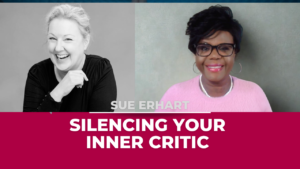Discover the profound metaphor of a, sharp mind, as compared to sharp knife. This week on the Transform Your Mind Podcast, Coach Myrna teaches you how to handle your mind properly to avoid self-destructive thoughts, anxiety, and stress. Myrna delves into strategies like mindfulness, positive thinking, and setting realistic goals to keep a, sharp mind.
Embrace techniques to foster emotional stability and creativity, ensuring your, sharp mind, becomes your greatest asset in life’s challenges. Download the podcast for tips on balancing rationality and emotion, and regularly engaging in mental exercises for continuous growth.
Download the podcast here:
Key Takeaways:
Mastering your mind, like handling a sharp knife, requires skill and care to avoid self-inflicted harm.
Overthinking, negative self-talk, and perfectionism are common pitfalls of mishandling our minds.
Cultivating mindfulness, positive thinking, and setting realistic goals are essential strategies for maintaining a, sharp mind.
The Power of a Sharp Mind and Sharp Knife
As Coach Myrna eloquently stated, “Just as a sharp knife is invaluable in the kitchen… a, sharp mind, is a tool of immense power.” This metaphor sets the stage for understanding the profound capabilities of our minds and the potential dangers if misused.
Our minds allow us to solve problems, think critically, and create innovative solutions. A well-honed mind can significantly improve various aspects of life, from decision-making to emotional stability. Myrna lists several benefits of a, sharp mind:
Improved Decision Making: “With a clear and focused mind, decisions are made based on logic and reason rather than impulse or emotion.”
Enhanced Learning: “A sharp mind absorbs information quickly and retains knowledge efficiently.”
Creativity: “A mind that is sharp and clear can think outside of the box, leading to innovative ideas.”
Emotional Stability: “A sharp mind maintains a sense of balance and composure.”
These attributes highlight the instrumental role of a focused mind in navigating life effectively. Like a knife making the cooking process efficient and enjoyable, a well-honed mind brings clarity and purpose to our daily tasks.

The Dangers of Mishandling Your Mind
The qualities that make a knife effective also make it dangerous if mishandled. This is equally true for the mind. Myrna warns us about the repercussions of not managing our minds properly:
Overthinking: “It can lead to stress, anxiety, and an inability to act decisively.”
Negative Self-Talk: “A sharp mind turned inward with negativity can cut deeply.”
Perfectionism: “Being overly critical… sets you up with unrealistic standards.”
These are the mental pitfalls equivalent to holding a sharp knife by its blade. Overthinking spins us into a relentless whirlpool of stress and indecision. Negative self-talk deepens our emotional wounds, leading to issues like low self-esteem and depression. Perfectionism, while seemingly noble, often results in chronic dissatisfaction as we set unattainable standards for ourselves.
Coach Myrna also emphasizes how “obsessive control” can exhaust and frustrate us, contributing to mental stress. By addressing these dangers, we recognize the importance of treating our minds with the same care and respect we would a sharp knife.
Strategies to Harness Mental Sharpness and a Sharp Mind
To wield our minds skillfully, similar to handling a sharp knife, specific strategies are essential. Coach Myrna suggests:
Mindfulness and Meditation: “These practices train your mind to focus on the present moment, reducing overthinking and fostering a sense of Peace.”
Positive Thinking: “Cultivate positive self-talk and challenge negative thoughts.”
Setting Realistic Goals: “Set achievable goals and recognize your progress.”

Mindfulness and Meditation
Training the mind through mindfulness and meditation involves focusing on the present moment. Myrna shares, “I do a meditation when they said your thoughts don’t control you… think of them [as] colorful balloons and let them float away.” By distancing from our thoughts, we prevent them from controlling us, reducing overthinking and anxiety.
Meditation encourages us to be mindful of simple bodily functions, such as the heartbeat or the blood flowing through our veins, which we often take for granted. This practice counters the common tendency to be consumed by worries and emotions, grounding us in a state of peace.
A Sharp Mind is a Positive Mind
Cultivating positivity in our self-talk is crucial but challenging. Coach Myrna advises using positive affirmations and challenging negative thoughts by asking, “Is it true? How do you know that it’s true?” This method, popularized by Byron Katie, helps break the cycle of negative thinking by confronting the validity of our assumptions.
Positive thinking isn’t about ignoring problems but approaching them with a solution-oriented mindset. This shift in perspective can profoundly impact our mental state, fostering resilience and optimism.
Setting Realistic Goals
Perfectionism often sets us up for failure with unrealistic expectations. Instead, Myrna suggests setting achievable goals and celebrating small victories. She emphasizes, “Happiness is working towards a goal… once you are working towards a goal, it’s the definition of what happiness is.”
This approach allows us to measure progress without falling into the trap of harsh self-criticism. Setting realistic goals instills a sense of accomplishment and keeps us motivated.
Mastering the art of mental precision requires diligent practice and conscious effort. Coach Myrna’s insights about treating our minds with the same care as a sharp knife provide a valuable framework for achieving mental well-being. By embracing mindfulness, fostering positive thinking, and setting realistic goals, we can harness the power of our minds effectively. This path not only prevents self-inflicted wounds but also unlocks our potential, transforming our minds to transform our lives.









